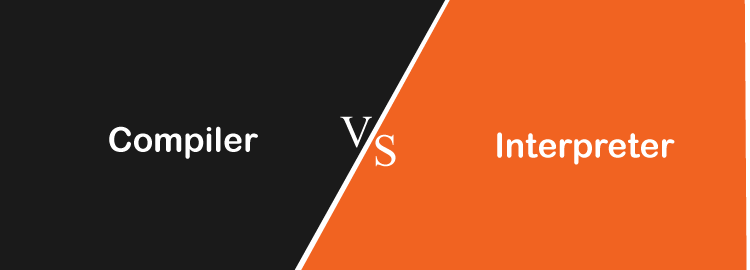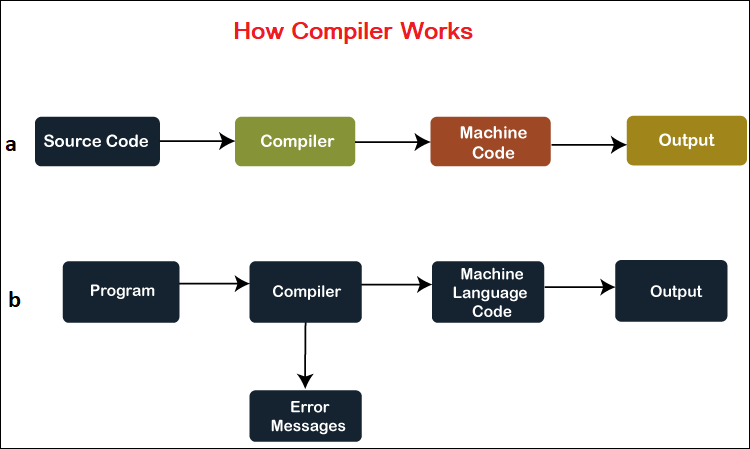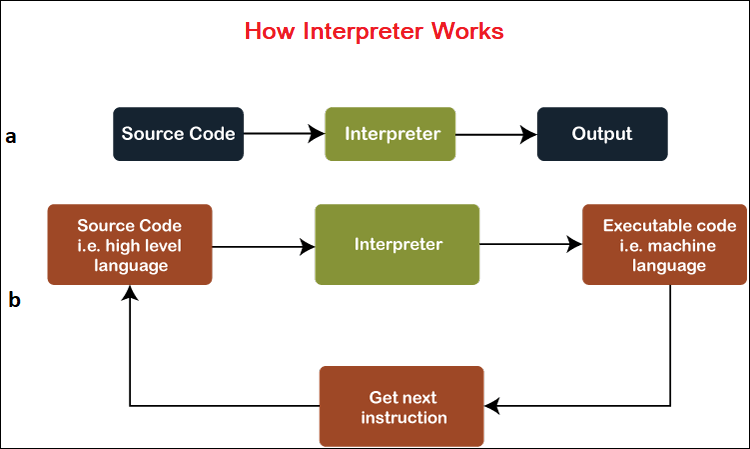Difference between Compiler and Interpreter
We mostly write a computer program in high-level languages, which humans understand. High-level languages are that which contains words and phrases from human languages - for example, English. The high-level programming language is also known as source code in a computer program. However, computer machine does not understand these high-level programming languages. It only understood its machine code, i.e., a program in 0's and 1's in binary form to perform the task accordingly.
To perform an instruction written in high-level language via computer, we need to convert it into machine language. To do this, either a compiler or an interpreter, or both are used to convert a source code programming language into machine code. Compiler and interpreter are software programs that convert a high-level language into a machine language (0's and 1's binary form) that a computer can understand and perform tasks as per the program's instructions. But there are variations in the working process and steps of a compiler and interpreter. Before diving into the difference between a compiler and an interpreter, let's see a brief introduction about both of them.

Compiler
A compiler is a software program that follows the syntax rule of programming language to convert a source code to machine code. It cannot fix any error if present in a program; it generates an error message, and you have to correct it yourself in the program's syntax. If your written program is correct (contains no error), then the compiler will convert your entire source code into machine code. A compiler converts complete source code into machine code at once. And finally, your program get executes.

The entire compilation steps of source code are operated into two phases: Analysis Phase and Synthesis Phase.
- Analysis Phase: This compiler phase is also known as the front end phase in which a source code is divided into fundamental parts to check grammar, syntax, and semantic of code; after that, the intermediate code is generated. The analysis phase of the compilation process includes a lexical analyzer, semantic analyzer, and syntax analyzer.
- Synthesis Phase: The Synthesis phase is also known as the back end phase in which the intermediate code (which was generated in Analysis Phase) is optimized and generated into target machine code. The synthesis phase of the compilation process includes code optimizer and code generator tasks.
Interpreter
An interpreter is also a software program that translates a source code into a machine language. However, an interpreter converts high-level programming language into machine language line-by-line while interpreting and running the program.

Difference between Compiler and Interpreter
| Difference Types |
Compiler |
Interpreter |
| Programming Steps |
- Write a program in source code.
- Compile will analyze your program statements and check their correctness. If an error is found in a program, it throws an error message.
- If the program contains no error, then the compiler will convert the source code program into machine code.
- The compiler links all the code files into a single runnable program, which is known as the exe file.
- Finally, it runs the program and generates output.
|
- Write a program in source code.
- No linking of files happens, or no machine code will generate separately.
- The source code programming statements are executed line-by-line during their execution. If an error is found at any specific statement interpreter, it stops further execution until the error gets removed.
|
| Translation type |
A compiler translates complete high-level programming code into machine code at once. |
An interpreter translates one statement of programming code at a time into machine code. |
| Advantage |
As the source code is already converted into machine code, the code execution time becomes short. |
As the source code is interpreted line-by-line, error detection and correction become easy. |
| Disadvantage |
If you want to change your program for any reason, either by error or logical changes, you can do it only by going back to your source code. |
Interpreted programs can run on only those computers which have the same interpreter. |
| Machine code |
It stores the converted machine code from your source code program on the disk. |
It never stores the machine code at all on the disk. |
| Running time |
A compiler takes an enormous time to analyze source code. However, overall compiled programming code runs faster as compression to an interpreter. |
An interpreter takes less time to analyze source code as compared to a compiler. However, overall interpreted programming code runs slower as compression to the compiler. |
| Program generation |
The compiler generates an output of a program (in the form of an exe file) that can run separately from the source code program. |
The interpreter doesn't generate a separate machine code as an output program. So it checks the source code every time during the execution. |
| Execution |
The process of program execution takes place separately from its compilation process. Program execution only takes place after the complete program is compiled. |
The process of program execution is a part of interpretation steps, so it is done line-by-line simultaneously. |
| Memory requirement |
A compiled program is generated into an intermediate object code, and it further required linking. So there is a requirement for more memory. |
An interpreted program does not generate an intermediate code. So there is no requirement for extra memory. |
| Best suited for |
The compiled program is bounded to the specific target machine. It requires the same compiler on the machine to execute; C and C++ are the most popular programming language based on the compilation model. |
In web environments, compiling takes place relatively more time to run even small code, which may not run multiple times. As load time is essential in the web environment, interpreters are better. JavaScript, Python, Ruby are based on the interpreter model. |
| Error execution |
The compiler shows the complete errors and warning messages at program compilation time. So it is not possible to run the program without fixing program errors. Doing debugging of the program is comparatively complex while working with a compiler. |
An interpreter reads the program line-by-line; it shows the error if present at that specific line. You must have to correct the error first to interpret the next line of the program. Debugging is comparatively easy while working with an Interpreter. |
Advantage and disadvantage of compiler
While using a compiler to translate a source code into machine code, the program codes are translated into different object codes. Hence the time of code execution is significantly less. The drawback of using a compiler is that you can only make changes in the program by going back to your source code.
Advantage and disadvantage of an interpreter
The interpreter makes it easier to work with source code. So it is highly preferred, especially for beginners. Interpreted programs can run on only those computers which have the same interpreter.
|



 For Videos Join Our Youtube Channel: Join Now
For Videos Join Our Youtube Channel: Join Now










